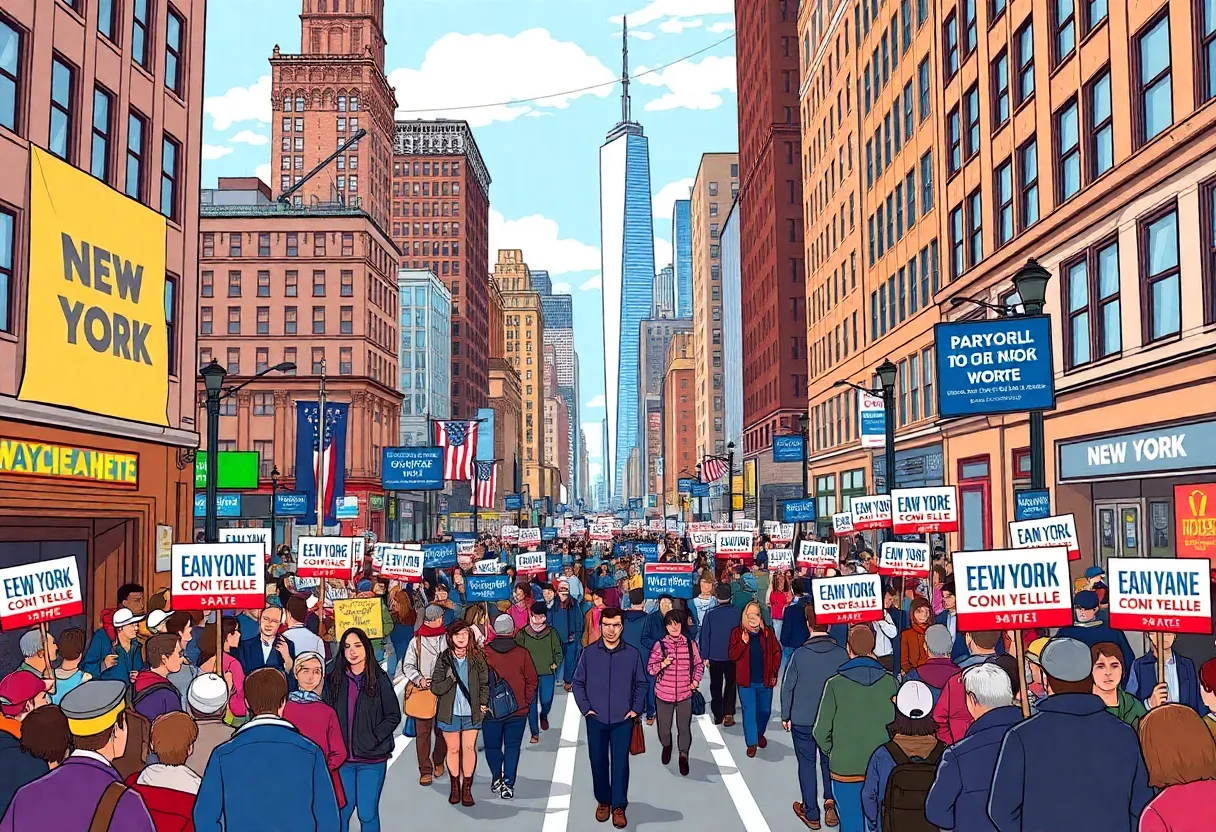News Summary
In a tightly contested mayoral race in New York City, progressive candidate Zohran Mamdani currently tops the polls as the Democratic nominee with 35% support. His platform, which includes socialist policies aimed at reducing economic inequality and housing challenges, has garnered significant backing from younger voters, despite concerns from investors and critics. Rivals, including Andrew Cuomo, are attempting to consolidate support to counter Mamdani’s influence as the election approaches.
New York City is witnessing an increasingly competitive mayoral race, with progressive candidate Zohran Mamdani currently leading the polls as the Democratic nominee. Recent data from July 2025 indicates that Mamdani commands 35% of voter support, significantly ahead of his rivals, including former Governor Andrew Cuomo at 25%, Curtis Sliwa at 14%, and Eric Adams at 11%. The momentum behind Mamdani’s campaign reflects his appeal among liberal voters, particularly within the younger demographics, despite the controversies surrounding his proposed policies.
Mamdani’s campaign platform is characterized by a series of socialist policies aimed at addressing economic inequality and housing challenges in New York City. Key proposals include expanding rent freezes to all stabilized apartments, which critics argue could drastically reduce landlord profitability and subsequently affect property values. Additionally, Mamdani advocates for reducing police funding and reallocating these resources to community programs, sparking concerns about public safety and its potential repercussions for local businesses.
Moreover, Mamdani aims to implement a 30% minimum wage by 2030 and impose increased taxes on “big banks” and technology firms. While these measures resonate with many voters, businesses worry that such policies could lead to corporate relocations, harming the city’s economic landscape. The proposed zoning reforms are designed to fast-track the development of affordable housing but could also impact high-end property developments.
The dynamics surrounding the election reveal an important factor: Democratic candidates hold a significant 6-to-1 advantage over Republicans, positioning Mamdani as a strong contender for the general election. However, this has prompted actions among rival candidates, with billionaires Michael Bloomberg and Bill Ackman urging Cuomo and Adams to unify their support to counter Mamdani’s growing influence. These calls for consolidation represent a last-ditch effort by some in the political establishment to maintain traditional power structures amid a rising demand for progressive change.
Concerns among investors regarding Mamdani’s policies have become evident, particularly as stocks of New York City’s real estate companies have already begun to suffer. Notably, stocks such as SL Green Realty (SLG) have seen a year-to-date decline of 18%, attributed to fears over corporate downsizing and the potential impact of rent control measures. Investors face several significant risks associated with Mamdani’s platform:
- Proposed rent controls could lead to lower rental yields and decreased property values.
- A potential slowdown in commercial development arising from increased corporate taxes may cause businesses to delay office leases or relocate.
- Rising operational costs stemming from unionization pressures tied to Mamdani’s endorsements could impact profitability.
As it stands, investors may consider strategic actions in response to the evolving political landscape. Recommendations include scaling back holdings in New York City-focused Real Estate Investment Trusts (REITs) such as SLG, EQR, and VNO. Keeping an eye on polling data in September is also advised, particularly if Mamdani’s support surpasses 40%, which might trigger an influx of capital away from NYC assets. Furthermore, there is an option to short NYC real estate ETFs or invest in markets like Miami or Austin that might offer more stability.
While Mamdani’s path to victory is not certain, it is clear that his policy proposals raise significant questions about the future business climate in New York City. The political narrative remains fluid, with Cuomo still actively challenging Mamdani despite losing in the Democratic primary, seeking to forge an alliance with the remaining candidates. This engagement may culminate in a mid-September poll aimed at identifying a strong alternative to Mamdani, although both Adams and Sliwa have expressed intentions to continue their campaigns.
In summary, as the New York City mayoral race unfolds, watchful eyes remain on Mamdani’s lead and the responses from his opponents. Stakeholders and voters alike are encouraged to stay informed about the evolving dynamics that may reshape the city’s governance and economic landscape.
Deeper Dive: News & Info About This Topic
HERE Resources
Concerns Rise as Zohran Mamdani Wins NYC Democratic Primary
New York City Mayoral Candidate Proposes 2% Tax Increase
NYC Political Landscape Shifts with New PAC for Mamdani
Mamdani Gains Momentum in NYC Mayoral Race Against Giants
Zohran Mamdani Leads NYC Mayoral Race After Primary Win
New Political Action Committee Emerges to Support Mamdani
New York City Business Leaders Mobilize Against Democratic Socialist Candidate
New York Ranks Tenth for Minority-Owned Businesses
Zohran Mamdani Wins NYC Democratic Primary for Mayor
Business Leaders Rally Behind Mayor Adams Amid Threat from Mamdani
Additional Resources
- ABC7 NY: Candidates in NYC Mayor Race
- Fox News: Andrew Cuomo Video Reaction
- AP News: Cuomo and Mamdani in NYC Mayor Election
- News Nation: Andrew Cuomo Running as Independent
- Wikipedia: New York City Mayoral Election 2025

Author: STAFF HERE NEW YORK WRITER
The NEW YORK STAFF WRITER represents the experienced team at HERENewYork.com, your go-to source for actionable local news and information in New York, the five boroughs, and beyond. Specializing in "news you can use," we cover essential topics like product reviews for personal and business needs, local business directories, politics, real estate trends, neighborhood insights, and state news affecting the area—with deep expertise drawn from years of dedicated reporting and strong community input, including local press releases and business updates. We deliver top reporting on high-value events such as New York Fashion Week, Macy's Thanksgiving Day Parade, and Tribeca Film Festival. Our coverage extends to key organizations like the Greater New York Chamber of Commerce and United Way of New York, plus leading businesses in finance and media that power the local economy such as JPMorgan Chase, Goldman Sachs, and Bloomberg. As part of the broader HERE network, including HEREBuffalo.com, we provide comprehensive, credible insights into New York's dynamic landscape.





